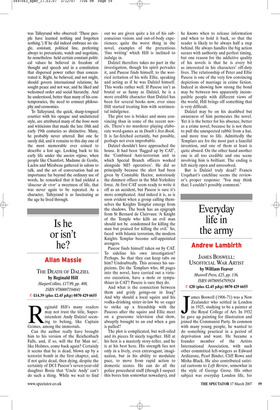Is he or isn’t he?
Allan Massie
THE DEATH OF DALZIEL by Reginald Hill HarperCollins, £17.99, pp. 408, ISBN 9780007194841 ✆ £14.39 (plus £2.45 p&p) 0870 429 6655 Reginald Hill’s many readers may not trust the title, Superintendent Andy Dalziel seeming to belong, like Captain Grimes, among the immortals.
Can the author really have brought him to his version of the Reichenbach Falls, and, if so, will the Fat Man no’, like Holmes, come back again? Certainly it seems that he is dead, blown up by a terrorist bomb in the first chapter, and, if not quite dead, then dying, despite the certainty of DCI Pascoe’s seven-year-old daughter Rosie that ‘Uncle Andy’ can’t do such a thing. While we wait to find out we are given quite a lot of his subconscious visions and out-of-body experiences; quite the worst thing in the novel, examples of the pretentious ‘fine writing’ which Hill is inclined to indulge in.
Dalziel therefore takes no part in the investigation, though his spirit pervades it, and Pascoe finds himself, to the worried irritation of his wife Ellie, speaking and acting as if he was Dalziel himself. This works rather well. If Pascoe isn’t as brutal or as funny as Dalziel, he is a more credible character than Dalziel has been for several books now, ever since Hill started treating him with sentimental indulgence.
The plot too is brisker and more convincing than in some of the recent novels. There’s no murderer playing elaborate word-games as in Death’s Jest-Book. It is far-fetched certainly, but possible, perhaps not even improbable.
Dalziel shouldn’t have approached the house. It had been ‘flagged up by CAT’, the ‘Combined Anti-terrorism unit in which Special Branch officers worked alongside MI5 operatives’. He did so principally because the alert had been given by Constable Hector, notoriously the dimmest officer in the Mid-Yorkshire force. At first CAT seem ready to write it off as an accident, but Pascoe is sure it’s more complicated. And indeed it is, as is soon evident when a group calling themselves the Knights Templar emerge from the shadows. The book has an epigraph from St Bernard de Clairvaux: ‘A Knight of the Temple who kills an evil man should not be condemned for killing the man but praised for killing the evil.’ So, faced with Islamic terrorism, the modern Knights Templar become self-appointed avengers.
Pascoe finds himself taken on by CAT. To sideline his own investigation? Perhaps. So that they can keep tabs on him? Undoubtedly. This arouses his suspicions. Do the Templars who, 60 pages into the novel, have carried out a virtuoso execution, have a mole or sympathiser in CAT? Pascoe is sure they do.
And what is the connection between them and grisly goings-on in Iraq? And why should a local squire and his vodka-drinking sister-in-law be so eager to strike up a friendship with the Pascoes after the squire and Ellie meet on a gruesome television chat show, abruptly brought to an end when a gun is pulled?
The plot is complicated, but well-oiled and its pieces fit nicely together. Hill at his best is a masterly story-teller, and he is at his best here. His strength lies not only in a lively, even extravagant, imagination, but in his ability to modulate pace, to move from rapid action to domestic scenes. He can do all the police procedural stuff (though I suspect this bores him somewhat nowadays), and he knows when to release information and when to hold it back, so that the reader is likely to be always half a step behind. He always handles the big action scenes with authority and perfect timing, but one reason for the addictive quality of his novels is that he is every bit as interested in his characters’ off-duty lives. The relationship of Peter and Ellie Pascoe is one of the very few convincing depictions of marriage in crime fiction. Indeed in showing how strong the bond may be between two apparently incompatible people with different views of the world, Hill brings off something that is very difficult.
Dalziel may be on his deathbed but awareness of him permeates the novel. Yet it is the better for his absence, better as a crime novel, because he is not there to pull the unexpected rabbit from a hat, and more true to life. Admittedly the Templars are for the most part a fanciful invention, and one of them at least is quite absurd. On the other hand another one is all too credible and one scene involving him is brilliant. The ending is left nicely open and unresolved.
But is Dalziel truly dead? Francis Urquhart’s catchline seems the reviewer’s proper response: ‘You may think that; I couldn’t possibly comment.’


































































































 Previous page
Previous page